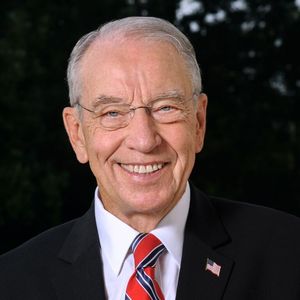Grassley, IRFA, IBB speak out against zero-emission vehicles bill

October 22, 2020
BY Erin Krueger
Two Iowa biofuel groups and Sen. Chuck Grassley, R-Iowa, on Oct. 22 spoke out against legislation introduced this week that aims to eliminate sales of internal combustion engine vehicles that can be fueled with biofuels.
Sen. Jeff Merkley, D-Ore., and Rep. Mike Levin, D-Calif., on Oct. 20 introduced the Zero-Emissions Vehicles Act of 2020, which aims to end U.S. sales of new gasoline-powered vehicles by 2035 and boost the market for battery electric vehicles and hydrogen fuel cell vehicles.
Under the bill, 50 percent of sales for new passenger vehicles would need to be zero emission vehicles (ZEVs) by 2025. The requirement for ZEVs would increase by 5 percent each year through 2035, when 100 percent of new passenger vehicle sales would have to be ZEVs. The ZEV standard would apply to the sale of new cars.
Grassley addressed the legislation in remarks made on the Senate floor on Oct. 22. “It is concerning to see legislation from progressive members of Congress that would eliminate internal combustion vehicles like the vast majority of us drive,” he said. “In other words, we will all have to buy electric cars. This is supposed to help the environment, but remember, most electrical generation is from fossil fuels. There are more practical solutions available. Currently, renewable fuels can reduce greenhouse gas emissions by 43 percent, but they would be totally eliminated under this extreme bill. By adding more ethanol and biodiesel to our energy mix, we can reduce emissions while still keeping transportation costs low for working families. I ask my colleagues across the aisle to abandon this radical scheme. If they want a cleaner environment then they should look to renewable fuels produced in our nation’s heartland.”
Advertisement
Advertisement
On the same day, the Iowa Renewable Fuels Association and the Iowa Biodiesel Board published an open letter to all candidates within the state running for federal office, urging them to oppose the Zero-Emissions Vehicles Act of 2020.
The letter also references a similar executive order that was issued by California Gov. Gavin Newsom last month. The executive order requires all sales of all new passenger vehicles in the state to be zero-emission by 2035. The executive order also calls for the California Air Resource Board to develop regulations to mandate that all operations of medium- and heavy-duty vehicles shall be zero-emission by 2045 where feasible.
“Needless to say, banning the sale of new vehicles powered by biofuels would be a hammer blow to Iowa’s ethanol and biodiesel producers and would crush a vital market for Iowa farmers,” wrote Grant Kimberley, executive director of the IBB, and Monte Shaw, executive director of the IRFA, in the letter. “Today, over half of Iowa’s corn crop goes into the production of ethanol and its coproducts, and over one-third of Iowa soybean oil goes to biodiesel production. Losing this market could very likely trigger another farm crisis.
“Further, banning the sale of biofuel powered vehicles is a flawed approach to combating climate change,” they continued. “While electric vehicles (EVs) will certainly play an increasing role in meeting our nation’s transportation needs, it is a fallacy to consider them ‘zero emission.’ In fact, studies have shown that in some parts of the country, a flexible fuel vehicle (FFV) running on E85 has a lower carbon footprint than an EV that was charged using electricity generated by coal. Biodiesel and renewable diesel can also outperform EVs in some situations depending on feedstock and the source of electricity. The federal Renewable Fuel Standard, California’s Low-Carbon Fuel Standard, and Oregon’s Clean Fuels Standard firmly establish the carbon reduction benefits of ethanol and biodiesel.
Advertisement
Advertisement
“In addition, there are exciting opportunities to pair EV and biofuel technologies to produce superior performance and environmental results for consumers. Hybrid EV-FFVs could play an important role for years beyond 2035. Biofuels are also continually reducing their carbon footprint due to improved processing technologies and more efficient farming practices.
“If there is to be federal legislation aimed at addressing vehicle carbon emissions, the best way to do this is to set reduction targets and let the fuel and vehicle market decide how to achieve the goals – a strategy that has worked in Oregon and California. Biofuels deserve a fair opportunity to compete in a low-carbon economy,” Kimberley and Shaw wrote.
A full copy the letter can be downloaded from the IRFA website.
Related Stories
Broco Energy on July 17 announced a new partnership with the Massachusetts Port Authority (Massport) to deliver and transition Massport's fuel tanks to renewable diesel across its various facilities.
Shell Aviation, Accenture, and Amex GBT on July 10 announced Avelia is in the process of evolving to an industry solution with independent data hosting and a multi-supplier model helping users access the GHG benefits of SAF.
The U.S EPA on July 17 released data showing more than 1.9 billion RINs were generated under the RFS during June, down 11% when compared to the same month of last year. Total RIN generation for the first half of 2025 reached 11.17 billion.
The U.S. EPA on July 17 published updated small refinery exemption (SRE) data, reporting that six new SRE petitions have been filed under the RFS during the past month. A total of 195 SRE petitions are now pending.
European biodiesel producer Greenergy on July 10 confirmed plans to shut down its biodiesel plant in Immingham, Lincolnshire, U.K. The company temporarily suspended operations at the facility earlier this year.
Upcoming Events










